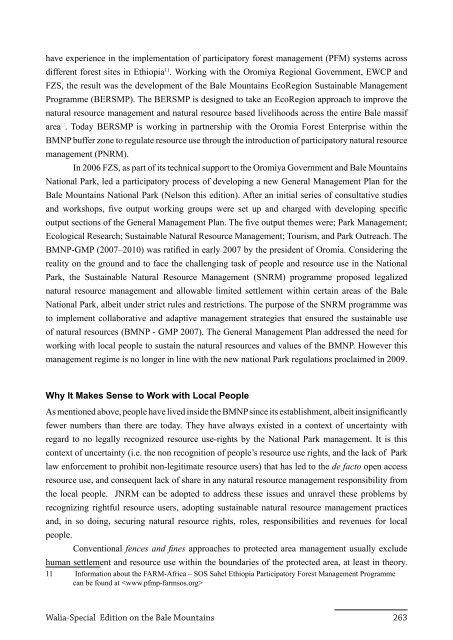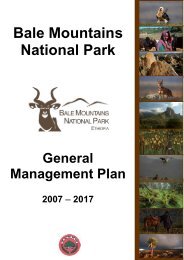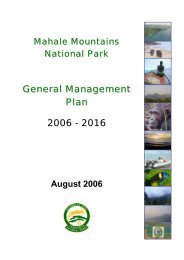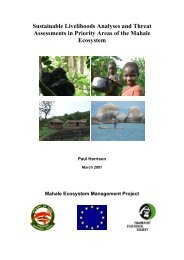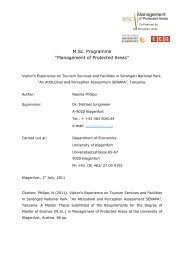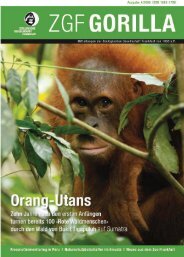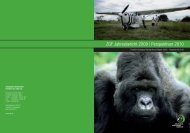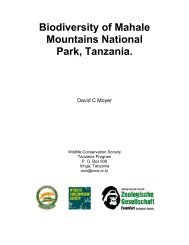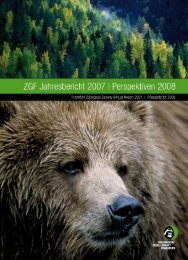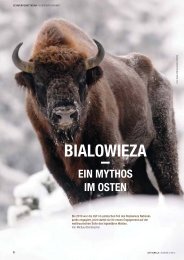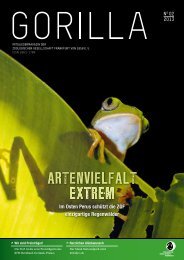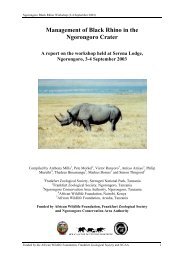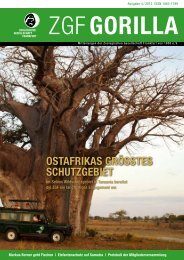Walia Special Edition on the Bale Mountains (2011) - Zoologische ...
Walia Special Edition on the Bale Mountains (2011) - Zoologische ...
Walia Special Edition on the Bale Mountains (2011) - Zoologische ...
You also want an ePaper? Increase the reach of your titles
YUMPU automatically turns print PDFs into web optimized ePapers that Google loves.
have experience in <strong>the</strong> implementati<strong>on</strong> of participatory forest management (PFM) systems across<br />
different forest sites in Ethiopia11 . Working with <strong>the</strong> Oromiya Regi<strong>on</strong>al Government, EWCP and<br />
FZS, <strong>the</strong> result was <strong>the</strong> development of <strong>the</strong> <strong>Bale</strong> <strong>Mountains</strong> EcoRegi<strong>on</strong> Sustainable Management<br />
Programme (BERSMP). The BERSMP is designed to take an EcoRegi<strong>on</strong> approach to improve <strong>the</strong><br />
natural resource management and natural resource based livelihoods across <strong>the</strong> entire <strong>Bale</strong> massif<br />
area . Today BERSMP is working in partnership with <strong>the</strong> Oromia Forest Enterprise within <strong>the</strong><br />
BMNP buffer z<strong>on</strong>e to regulate resource use through <strong>the</strong> introducti<strong>on</strong> of participatory natural resource<br />
management (PNRM).<br />
In 2006 FZS, as part of its technical support to <strong>the</strong> Oromiya Government and <strong>Bale</strong> <strong>Mountains</strong><br />
Nati<strong>on</strong>al Park, led a participatory process of developing a new General Management Plan for <strong>the</strong><br />
<strong>Bale</strong> <strong>Mountains</strong> Nati<strong>on</strong>al Park (Nels<strong>on</strong> this editi<strong>on</strong>). After an initial series of c<strong>on</strong>sultative studies<br />
and workshops, five output working groups were set up and charged with developing specific<br />
output secti<strong>on</strong>s of <strong>the</strong> General Management Plan. The five output <strong>the</strong>mes were; Park Management;<br />
Ecological Research; Sustainable Natural Resource Management; Tourism, and Park Outreach. The<br />
BMNP-GMP (2007–2010) was ratified in early 2007 by <strong>the</strong> president of Oromia. C<strong>on</strong>sidering <strong>the</strong><br />
reality <strong>on</strong> <strong>the</strong> ground and to face <strong>the</strong> challenging task of people and resource use in <strong>the</strong> Nati<strong>on</strong>al<br />
Park, <strong>the</strong> Sustainable Natural Resource Management (SNRM) programme proposed legalized<br />
natural resource management and allowable limited settlement within certain areas of <strong>the</strong> <strong>Bale</strong><br />
Nati<strong>on</strong>al Park, albeit under strict rules and restricti<strong>on</strong>s. The purpose of <strong>the</strong> SNRM programme was<br />
to implement collaborative and adaptive management strategies that ensured <strong>the</strong> sustainable use<br />
of natural resources (BMNP - GMP 2007). The General Management Plan addressed <strong>the</strong> need for<br />
working with local people to sustain <strong>the</strong> natural resources and values of <strong>the</strong> BMNP. However this<br />
management regime is no l<strong>on</strong>ger in line with <strong>the</strong> new nati<strong>on</strong>al Park regulati<strong>on</strong>s proclaimed in 2009.<br />
Why It Makes Sense to Work with Local People<br />
As menti<strong>on</strong>ed above, people have lived inside <strong>the</strong> BMNP since its establishment, albeit insignificantly<br />
fewer numbers than <strong>the</strong>re are today. They have always existed in a c<strong>on</strong>text of uncertainty with<br />
regard to no legally recognized resource use-rights by <strong>the</strong> Nati<strong>on</strong>al Park management. It is this<br />
c<strong>on</strong>text of uncertainty (i.e. <strong>the</strong> n<strong>on</strong> recogniti<strong>on</strong> of people’s resource use rights, and <strong>the</strong> lack of Park<br />
law enforcement to prohibit n<strong>on</strong>-legitimate resource users) that has led to <strong>the</strong> de facto open access<br />
resource use, and c<strong>on</strong>sequent lack of share in any natural resource management resp<strong>on</strong>sibility from<br />
<strong>the</strong> local people. JNRM can be adopted to address <strong>the</strong>se issues and unravel <strong>the</strong>se problems by<br />
recognizing rightful resource users, adopting sustainable natural resource management practices<br />
and, in so doing, securing natural resource rights, roles, resp<strong>on</strong>sibilities and revenues for local<br />
people.<br />
C<strong>on</strong>venti<strong>on</strong>al fences and fines approaches to protected area management usually exclude<br />
human settlement and resource use within <strong>the</strong> boundaries of <strong>the</strong> protected area, at least in <strong>the</strong>ory.<br />
11 Informati<strong>on</strong> about <strong>the</strong> FARM-Africa – SOS Sahel Ethiopia Participatory Forest Management Programme<br />
can be found at <br />
<str<strong>on</strong>g>Walia</str<strong>on</strong>g>-<str<strong>on</strong>g>Special</str<strong>on</strong>g> <str<strong>on</strong>g>Editi<strong>on</strong></str<strong>on</strong>g> <strong>on</strong> <strong>the</strong> <strong>Bale</strong> <strong>Mountains</strong> 263


